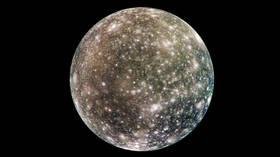A habitable base in space? Russia’s Space Agency believes humans could one day live on Callisto, Jupiter’s second largest moon

Russian space agency, Roscosmos, considers Callisto, Jupiter's second-largest moon, as possible location for a habitable base in space. That's according to Alexander Bloshenko, the corporation's director for long-term programs.
"In terms of places where it is most suitable to set up a base for humans, Callisto is the third best, after the Moon and Mars," said Bloshenko.
In particular, Roscosmos is attracted to the natural satellite's surface of ice, which could have a subsurface ocean of liquid water. Moreover, seismic activity detected on the moon of Jupiter means that it must have a hot central core.
Discovered in 1610 by Galileo Galilei, Callisto has long been thought of as a possible place for future human habitation. Due to low levels of radiation and locational stability, it is believed that it could one day host a base for further exploration into the solar system. In 2022, the European Space Agency plans to send the Jupiter Icy Moons Explorer (JUICE) to study three of the planet's moons, which are thought to be habitable environments. It will take over 7 years for the Explorer to reach Jupiter.
Also on rt.com It may be a ‘living hell,’ but it’s a ‘Russian planet’: Moscow will focus efforts on exploration of Venus, space agency chief saysEarlier this week, Roscosmos head Dmitry Rogozin announced that the space agency plans to send probes to Venus, calling it a "Russian planet." In 1970, the Soviet Union became the only country to successfully land on the second rock from the sun.
Like this story? Share it with a friend!














